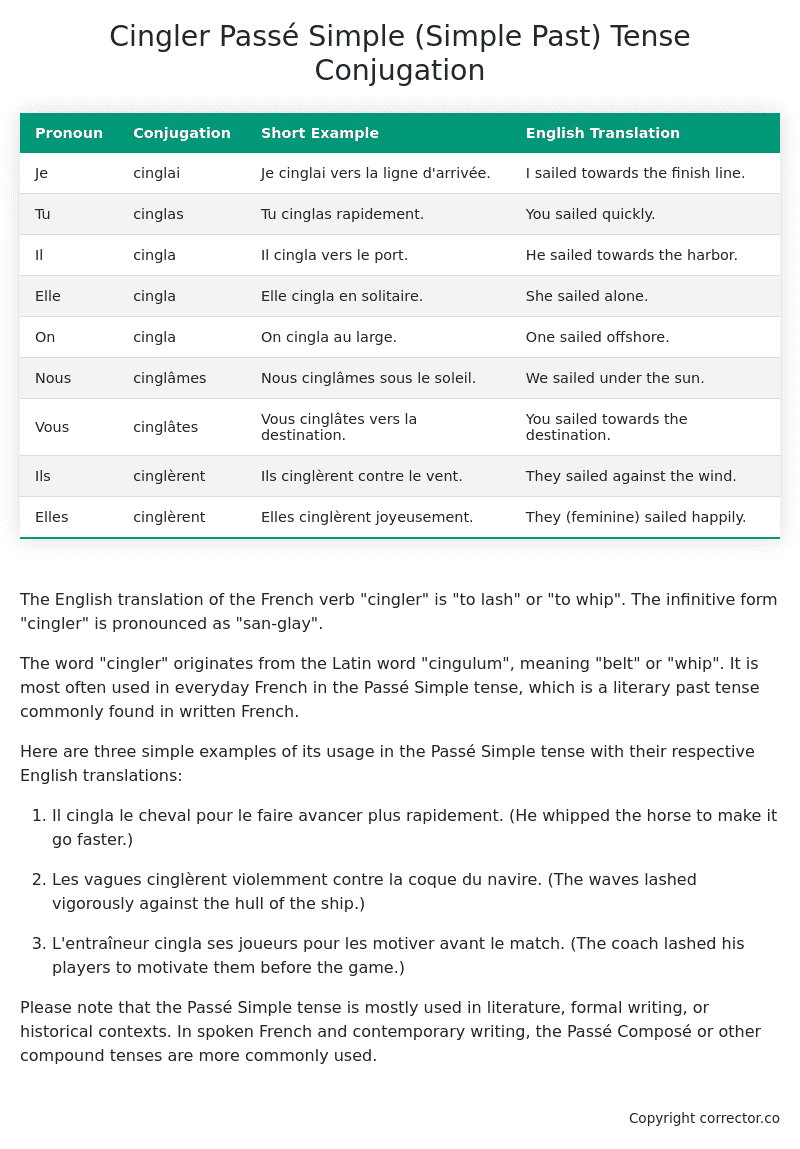Passé Simple (Simple Past) Tense Conjugation of the French Verb cingler
Introduction to the verb cingler
The English translation of the French verb “cingler” is “to lash” or “to whip”. The infinitive form “cingler” is pronounced as “san-glay”.
The word “cingler” originates from the Latin word “cingulum”, meaning “belt” or “whip”. It is most often used in everyday French in the Passé Simple tense, which is a literary past tense commonly found in written French.
Here are three simple examples of its usage in the Passé Simple tense with their respective English translations:
-
Il cingla le cheval pour le faire avancer plus rapidement.
(He whipped the horse to make it go faster.) -
Les vagues cinglèrent violemment contre la coque du navire.
(The waves lashed vigorously against the hull of the ship.) -
L’entraîneur cingla ses joueurs pour les motiver avant le match.
(The coach lashed his players to motivate them before the game.)
Please note that the Passé Simple tense is mostly used in literature, formal writing, or historical contexts. In spoken French and contemporary writing, the Passé Composé or other compound tenses are more commonly used.
Table of the Passé Simple (Simple Past) Tense Conjugation of cingler
| Pronoun | Conjugation | Short Example | English Translation |
|---|---|---|---|
| Je | cinglai | Je cinglai vers la ligne d’arrivée. | I sailed towards the finish line. |
| Tu | cinglas | Tu cinglas rapidement. | You sailed quickly. |
| Il | cingla | Il cingla vers le port. | He sailed towards the harbor. |
| Elle | cingla | Elle cingla en solitaire. | She sailed alone. |
| On | cingla | On cingla au large. | One sailed offshore. |
| Nous | cinglâmes | Nous cinglâmes sous le soleil. | We sailed under the sun. |
| Vous | cinglâtes | Vous cinglâtes vers la destination. | You sailed towards the destination. |
| Ils | cinglèrent | Ils cinglèrent contre le vent. | They sailed against the wind. |
| Elles | cinglèrent | Elles cinglèrent joyeusement. | They (feminine) sailed happily. |
Other Conjugations for Cingler.
Le Present (Present Tense) Conjugation of the French Verb cingler
Imparfait (Imperfect) Tense Conjugation of the French Verb cingler
Passé Simple (Simple Past) Tense Conjugation of the French Verb cingler (You’re reading it right now!)
Passé Composé (Present Perfect) Tense Conjugation of the French Verb cingler
Futur Simple (Simple Future) Tense Conjugation of the French Verb cingler
Futur Proche (Near Future) Tense Conjugation of the French Verb cingler
Plus-que-parfait (Pluperfect) Tense Conjugation of the French Verb cingler
Passé Antérieur (Past Anterior) Tense Conjugation of the French Verb cingler
Futur Antérieur (Future Anterior) Tense Conjugation of the French Verb cingler
Subjonctif Présent (Subjunctive Present) Tense Conjugation of the French Verb cingler
Subjonctif Passé (Subjunctive Past) Tense Conjugation of the French Verb cingler
Subjonctif Imparfait (Subjunctive Imperfect) Tense Conjugation of the French Verb cingler
Subjonctif Plus-que-parfait (Subjunctive Pluperfect) Tense Conjugation of the French Verb cingler
Conditionnel Présent (Conditional Present) Tense Conjugation of the French Verb cingler
Conditionnel Passé (Conditional Past) Tense Conjugation of the French Verb cingler
Conditionnel Passé II (Conditional Past II) Tense Conjugation of the French Verb cingler
L’impératif Présent (Imperative Present) Tense Conjugation of the French Verb cingler
L’impératif Passé (Imperative Past) Tense Conjugation of the French Verb cingler
L’infinitif Présent (Infinitive Present) Tense Conjugation of the French Verb cingler
L’infinitif Passé (Infinitive Past) Tense Conjugation of the French Verb cingler
Le Participe Présent (Present Participle) Tense Conjugation of the French Verb cingler
Le Participe Passé (Past Participle) Tense Conjugation of the French Verb cingler
Struggling with French verbs or the language in general? Why not use our free French Grammar Checker – no registration required!
Get a FREE Download Study Sheet of this Conjugation 🔥
Simply right click the image below, click “save image” and get your free reference for the cingler Passé Simple tense conjugation!

Cingler – About the French Passé Simple (Simple Past) Tense
Formation
Usage
Narration
Historical Context
Interactions with other tenses
Passé Composé
Imparfait
Conditional and Subjunctive
Summary
I hope you enjoyed this article on the verb cingler. Still in a learning mood? Check out another TOTALLY random French verb conjugation!


